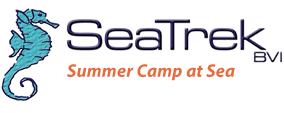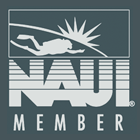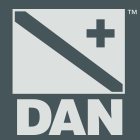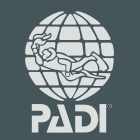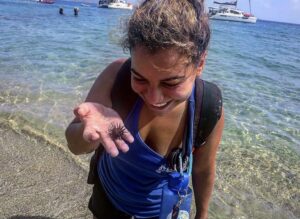 “Oh, you’re a marine scientist? I would love to play with dolphins all day!” My honest response to that might be confusing: “Yeah, I would love that, too!” As a marine scientist, I don’t get to play with dolphins all day. (I know dolphin scientists who also don’t play with dolphins all day.)
“Oh, you’re a marine scientist? I would love to play with dolphins all day!” My honest response to that might be confusing: “Yeah, I would love that, too!” As a marine scientist, I don’t get to play with dolphins all day. (I know dolphin scientists who also don’t play with dolphins all day.)
I’m Anna Ortega, and I’ve worked at SeaTrek BVI as the Airport Liaison, a Boat Biologist, the Lead Biologist, and now: the Marine Science Consultant. That means that I work with our science team to keep the science curriculum at SeaTrek up-to-date and interactive!
Throughout my time at SeaTrek, I’ve shared a lot of my science knowledge with you, our SeaTrek students. The wisdom I want to share with you now (and anyone considering SeaTrek or a marine biology profession) is a realistic look at what a marine science career entails.
How did I get started?
I was born and raised in Michigan: almost equally lakes and land, but 0% ocean. We do have lake turtles, and that was enough to get me hooked on aquatic life. When I was nine, my family took a trip to the US Virgin Islands. I learned how to snorkel, encountered my first sea turtle, and met a scuba instructor who taught me that exploring the marine world could be my full-time job. I made it my goal to have a career like that, and life’s never been the same.
Things I’ve done to accomplish that goal since my trip to the USVI:
- Got scuba certified (In Ohio. In October. In 50°F/10°C weather.)
- Attended two science summer camps
- Volunteered in scientific research labs studying wasps, microbiology, and eagle ray identification
- Served as a research assistant at NOAA (National Oceanic and Atmospheric Administration)
- Studied abroad in South Caicos
- Spent three summers at SeaTrek BVI with all of you (the best job ever!)
- Earned a bachelor’s degree from the University of Michigan
- Started graduate school: I’m currently a master’s student at the University of Western Australia
- My project focuses on trying to prevent the population collapse of a leatherback sea turtle population by predicting the future
- I make computer models that factor in variables including climate change, hurricanes, bycatch, etc., and then simulate what will happen to the sea turtle population. The goal is to manipulate the model to create situations where the population starts to recover. Then, implement those model changes in the real world, in hopes of saving the population.
- My project focuses on trying to prevent the population collapse of a leatherback sea turtle population by predicting the future
What’s next?
I’ll go on to pursue my Ph.D. and further my education in marine science. From there, I can ta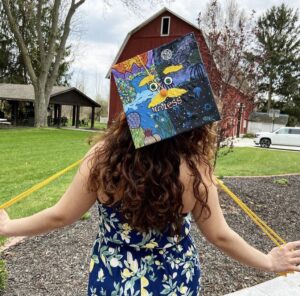 ke two routes:
ke two routes:
- “Postdoc” position within a professor’s lab, then move my way up (Assistant ProfessoràAssociate ProfessoràFull Professor) until I run my own lab at a university: teaching classes and researching whatever I choose.
- Or, exit the academic world to work as a scientist in the government (NOAA) or private (OceanX) sector.
In either choice, I could focus on research, or different aspects of science: education, conservation, public outreach. My goal is to work towards a career that lets me spend part of my year researching in the field and focuses on marine conservation, where I can help save at-risk species by doing research, communicating with locals, and educating the public.
I knew in elementary school that I wanted to conduct my own marine science research. Throughout my education I discovered that to do that, I would need to complete a master’s degree.
Here are some other things I wish I knew back then:
- Marine science is a diverse combination of different disciplines in the science field.
- Prerequisites to your marine science course include; physics, genetics, calculus, chemistry, ecology, statistics, biochemistry, writing, coding, etc.
- The best way to see if you like science (or anything for that matter) is to get hands-on experience.
- Hands-on science opportunities such as SeaTrek BVI, FATHOMS, Academic Credit or volunteer work let you try science out and see if you like it.
- Make sure you give yourself a wide range of experiences. Every time you do fieldwork means that there will be hours of other work: sample processing in the lab, entering data into a computer, analyzing your data, and writing up your report.
- Beach days (as we know them at SeaTrek BVI) are not part of the job.
- On “beach days” you will be conducting fieldwork: dirty, sandy, salty, but so much fun.
- The ocean is the broadest ecosystem on the planet, and it’s home to many amazing points of study, from the ocean floor to the organisms that inhabit it.
- It’s equally vital that we learn about everything: whales, turtles, dolphins, phytoplankton, currents, and hydrothermal vents.
- Marine biology may be the most famous ocean career, but it’s only one of hundreds of options. Geneticists, chemists, physicists,
- Science is a lot more failure than it is success.
- If your science is simple and easy, you’re not doing science.
- Setbacks are totally normal and expected – they push you and teach you – embrace them and keep moving forward with more questions, hypotheses, research!
- It isn’t fair to only ask kids what they want to be when they grow up.
- Learning and deciding what you want to be is a lifelong journey.
- We live in a world with millions of resources at our fingertips; use them.
- Watch documentaries and movies, join webinars and live streams, read books and articles, never stop learning about what interests you.
- If you see someone’s work (a documentary, a book, a scientific article) that inspires you, reach out to them.
- This is how I attained so many opportunities. What may start with an
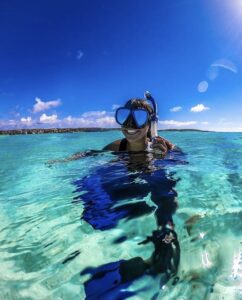 email motivated by your enthusiasm can blossom into a mentorship, partnership, or a position on their team!
email motivated by your enthusiasm can blossom into a mentorship, partnership, or a position on their team! - I used to be scared by “the importance of networking”, but it just means conversing with people who are doing what you love. It’s good to make these connections in your field; they may turn out to be pivotal to getting your dream job!
- This is how I attained so many opportunities. What may start with an
What fuels my career beyond all of these realities is my unwavering passion for marine science. It’s okay not to know what you’re passionate about yet, follow what interests and excites you. If you’re lucky enough to understand what drives your passion, please chase it.
If you’ve been with me on program, you know I could talk about science all day. If you have questions or want to exchange science fun facts, you can reach me at anna@seatrekbvi.com. Share your academic goals with us on Facebook, Instagram, and Twitter and stay tuned for more fun blogs and events near you.
